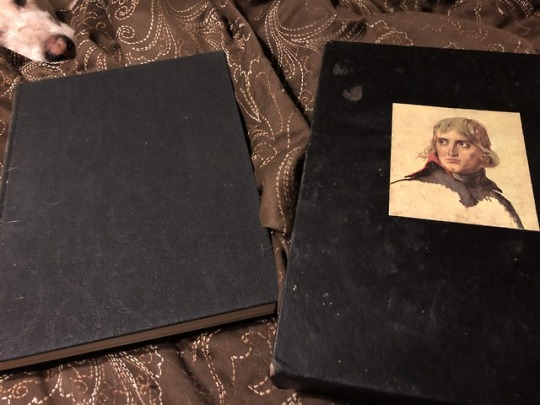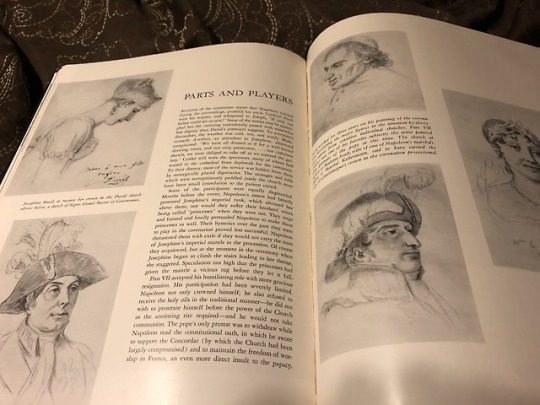#J. Christopher Herold
Text
“The women are everywhere—plays, public walks, libraries. You can see pretty women in the scholar’s study room. . . . A woman, in order to know what is due her and what power she has, must live in Paris for six months.”
— Napoleon in a letter to his brother, Joseph
Source: J. Christopher Herold, The Age of Napoleon
#the emperor has spoken ☝️#napoleon#napoleon bonaparte#joseph bonaparte#Joseph#J. Christopher Herold#herold#Paris#napoleonic era#napoleonic#first french empire#french empire#france#women’s history#19th century#history#Napoleon’s correspondence#letter#Napoleon’s quotes#Napoleon and women#women#Napoleon’s brothers#the age of Napoleon
118 notes
·
View notes
Text
"The President will realize what an imbecile he has sent us."

Mind of Napoleon: A Selection of His Written and Spoken Words by J. Christopher Herold, 1955.
9 notes
·
View notes
Text
J. Christopher Herold Aikakautensa valtiatar : rouva de Staëlin elämäkerta: "Poliittiset ajatukset olivat rouva Staëlin intohimo-tutkielmassa paljon aidompia ja hedelmällisempiä kuin hänen yrityksensä löytää tietä henkilökohtaiseen onneen. Hän aloittaa näin: yksilön ja onnen välillä on perustavaa laatua oleva ero. Yksilöllisen onnen pyrkimyksen on tähdättävä täydelliseen intohimojen hallintaan, kun taas poliittisen vapauden (jota hän pitää onnen kanssa yhteneväisenä, kun on kysymys kansoista) on perustettu kalkyylille, joka ottaa huomioon tietyn väestön keskuudessa vallitsevan näennäisvakiosuuruisen määrän intohimoja. Hallitusmuodon muuttumattomuus (hän aikoi osoittaa sen kirjansa toisessa osassa) on funktiona sen kyvyssä antaa niin suurta vapautta ihmisen luonnolliselle intohimoille kuin sen oma säilyminen sallii. Todennäköisyyslaskennan ja tilastotieteen kehitys tekisi mahdolliseksi määrätä ja ennustaa inhimillistä käytöstä, inhimillisiä intohimoja joukoissa. Mitä suurempi joukko, sitä tarkempi laskelma. Tietyissä valtioissa, hän tähdentää, on mahdollista ennustaa niiden murhien ja avioerojen lukumäärä, jotka tulevat tapahtumaan annettuna vuotena."
0 notes
Quote
The artist's temperament is characterized by his dissatisfaction with the orderly nature of the world such as he finds it. He creates his own world, with laws and conventions far more absolute than those of the world of men.
J. Christopher Herold, from his introduction to The Mind of Napoleon: A Selection of His Written and Spoken Words.
8 notes
·
View notes
Photo







Pretty Napoleon books 3/?
The Horizon Book of The Age of Napoleon, Horizon Magazine, J. Christopher Herold
Extra cuteness added for my doggo Logan photo-bombing.
#napoleon#bonaparte#Napoleon Bonaparte#Emperor Napoleon#Emperor Napoleon I#Emperor Napoleon Ier#Napoleon Ier#Napoleon I#J Christopher Herold#Horizon Magazine#The Age of Napoleon#This one comes with a book case#my stuff#my books#book collection#always growing#must have all the books
28 notes
·
View notes
Text

-J. Christopher Herold, The Age of Napoleon
80 notes
·
View notes
Text
Quotes on Diplomacy
Quotes on Diplomacy
1. Diplomacy is to do and say the nastiest thing in the nicest way. —Isaac Goldberg
2. Diplomacy is the art of fishing tranquilly in troubled waters. —J. Christopher Herold
3. Diplomacy : The art of jumping into troubled waters without making a splash. —Art Linkletter
4. Diplomacy-lying in state. —Oliver Herford
5. Diplomacy is the art of letting someone else have your way.…
View On WordPress
0 notes
Text
One must, in one's life, make choice between boredom and suffering.
Anne Louise Germaine de Stael in a letter to Claude Hochet (Summer 1800), quoted in J. Christopher Herold, Mistress to an Age: A Life of Madame de Staël (New York: Grove Press, 1958)
0 notes
Text
Napoleon’s hatred of phrenology and the study of physiognomy
Phrenology: a pseudoscience that involves the measurement of bumps on the skull to predict mental traits.
Physiognomy: the supposed art of judging character or traits from facial characteristics. (Also a synonym for face features or expression)
Phrenology and physiognomy were popular theories during Napoleon’s lifetime which were believed to “establish a scientific and systematic relationship between facial and moral characteristics” (J. Christopher Herold). Napoleon expressed a strong disagreement with these ideas:
“Look at the idiotic theory of Gall [the founder of phrenology]: he attributes to certain prominences [of the skull] tendencies and crimes which are not inborn but which are merely products of society and of human conventions. What would become of the ‘bump of thievery’ if there were no property? What of the ‘bump of drunkenness,’ if there were no alcoholic beverages? What of the ‘bump of ambition,’ if there were no society?”
Source: Profils des contemporains par Napoleon (1824)
“One never must judge a man by his physiognomy. Men must be tested to be known. How many faces I had to judge in my life! What opportunities for acquiring experience! How many denunciations, how many reports have I listened to! And indeed I made it a fixed rule never to allow myself to be influenced either by facial traits or by words.”
Source: Mind of Napoleon: A Selection of his Written and Spoken Words (1955), J. Christopher Herold
“It is a mistake to say that the face is the mirror of the soul. The truth is, people are very hard to know, and yet, not to be deceived, we must judge them by their present actions, but for the present only.”
Source: Napoleon: In His Own Words (1916), Jules Bertaut, as translated by Herbert Edward Law and Charles Lincoln Rhodes
#napoleon#napoleon bonaparte#J. Christopher Herold#Herold#quotes#napoleonic era#napoleonic#first french empire#french empire#quotes by Napoleon#napoleon quotes
147 notes
·
View notes
Text
Harika Sözler
Bir şeyi gerçekten yapmak isterseniz bir yolunu bulursunuz. İstemeseniz de, bir bahane bulursunuz… (Jim Rohn)
Ne kadar değişirsen değiş, ilk nerede mutlu olduysan, hep oraya çevirirsin kafanı… (Jean-Christophe Grange)
Cesaret kendin olmak için her şeyi riske atmaktır. (Cavit Çağ)
Her şeyin yenisi, dostun ise eskisi makbuldür. (Peyami Safa)
Dünyada görmek istediğiniz değişikliğin kendisi siz olun. (Mohandas Gandhi)
İnsanı doğru eyleme sevk eden sevgidir. Sevgi dünyaya düzen getirir. Bırakın Sevgi istediğini yapsın...!( Jiddu Krishnamur )
Hayat iki şekilde yaşanır; Ya hiç mucize yokmuş gibi, ya da her şey birer mucizeymiş gibi! (Albert Einstein )
Gönlü ışık yakmayı, aydınlanmayı öğrenen kişiyi, güneş bile yakamaz. Gündüz gibi ışıyıp durmayı istiyorsan, geceye benzeyen benliğini yakıver...!( Mevlana)
Mutluluk kovalandığında asla kendini yakalatmayan bir kelebeğe benzer. Fakat sessizce oturup beklersen üzerine konabilir. (Nathaniel Hawthorne)
Sorun çaresizlik değil, isteksizlik. İsteksiziz, çünkü çocuklukta bize uygulanan ilk şey, içimizdeki isteği öldürmektir. (Bernard Shaw)
Bastırmak demek bilinçaltına itmek demektir. Ne kadar çok bastırırsan o kadar büyük bir bilinçaltın olur. (Osho)
Hayat öyle oyunlar oynuyor ki, nereye tutunsam düşüyorum. Tam da palyaçonun dediği gibi, ağlayamadığımdan gülüyorum. (Paul Auster.)
En kusursuz cinayet; birinin yaşama sevincini öldürmektir. (Paulo Coelho)
Doymak bilmeyen fakirdir; ellindekiyle yetinen zengindir elindekini paylaşan daha da zengindir. (James Allen)
Hiç kimse başarı merdivenine elleri cebinde tırmanmamıştır. (Jketh Moorhead)
Uzaklıklar küçük sevgileri yok eder, büyükleri yüceltir. Tıpkı rüzgarın mumu söndürüp ateşi yükselttiği gibi.
Bir şeye ait her şeyi öğrenin; her şeye dair bir şeyler bilin. (Var Kyke)
Hiçbir zaman çıktığın kapıyı hızlı çarpma geri dönmek isteyebilirsin. (Don Herold)
İki şey aklın eksikliğini gösterir: konuşulacak yerde susmak, susulacak yerde konuşmak. (Sadi)
İnsan ne kadar yükselirse, gönlü o kadar alçalmalıdır. (Çiçero)
Hiç kimse duymak istemeyen biri kadar sağır olamaz. (Wshakspeare)
Gideceğiniz yeri bilmiyorsanız, vardığınız yerin önemi yoktur. (Peter Fdrucker)
Bir şeyi gerçekten bilmek, onu anlatmakla olur. (Sokrates)
Bugün, hayatınızın geri kalanının ilk günüdür. (1970’lerin duvar yazısı)
Düşünmeden öğrenmek faydasız, öğrenmeden düşünmek tehlikelidir. (Konfuçyüs)
Erişmek istedikleri bir hedefi olmayanlar, çalışmaktan zevk almazlar. (Emile Raux)
Evinizin eşiğini temizlemeden, komşunuzun damındaki karlardan şikayet etmeyiniz. (Konfucyus)
Evlilikte başarı yalnız aranan kişiyi bulmakta değil, aranan kişi olmaya da bağlıdır. (Foster Wood)
Ey yaşam senin bunca değerli oluşun, ölüm sayesindedir. (Seneca)
Güzel yüz aynaya aşıktır. (Mevlana)
Akıllı adam aklını kullanır daha akıllı adam başkalarının da aklını kullanır. (Bernard Shaw)
Bilgi büyük adamı alçak gönüllü yapar, normal adamı şaşırtır, küçük adamı ise kibirlendirir. (Brigitte)
Bilgi cesaret verir, cehalet küstahlık. (Terry)
Bilgiyle dirilenler ölmez. (Hz. Ali)
Hayatta bir gayesi olmayan insanlar, bir nehir üzerinde akıp giden saman çöplerine benzerler; Onlar gitmezler, ancak suyun akışına kapılırlar. (Seneca)
Hedefi olmayan gemiye hiçbir rüzgar yardım edemez. (Montaigne)
Her bildiğini söyleme, her söylediğini bil. (Clavdius)
Her münakaşanın temelinde birisinin cahilliği yatar. (Louis D. Brandeis)
Herkesi bir defa, bazılarını her zaman aldatabilirsiniz ama herkesi her zaman aldatamazsınız. (Abraham Lincoln)
Her şeyin anahtarı sabırdır, civcivi yumurtaları kuluçkaya yatırarak elde edersiniz, kırarak değil. (Arnold Closow)
Hırs, bir sandalın yelkenini şişiren rüzgara benzer; fazlası gemiyi batırır, azı da gemiyi olduğu yerde tutar. (Woltaire)
İnsanlar ancak hayalleriyle yaşar ve biraz yaşamaya başlayınca tüm hayallerini kaybederler. (Voltaire)
İnsanları niçin öldürüyorsunuz, biraz bekleyin zaten ölecekler. (Konfucyus)
İyiliğin bilgisine sahip olmayana bütün diğer bilgiler zarar verir. (Montaigne)
Kendine hakim olan başkalarına da hakim olur. (Konfucyus)
Kendini herkese uydurmak için yontmaya koyulanlar, sonunda yontula yontula tükenip giderler. (R. Hull)
Kıyıyı gözden kaybetmeye cesaret etmedikçe insan, yeni okyanuslar keşfedemez. (Andre Gide)
Sanat bir yalandır, ama gerçeği söyleyen bir yalan. (Picasso)
Önce doğruyu bilmek gerekir, doğru bilinirse yanlış da bilinir ama önce yanlış bilinirse doğruya ulaşılamaz. (Farabi)
Rüyaları gerçekleştirmenin en kısa yolu uyanmaktır. (Emerson)
Taş da yumurtanın üstüne düşse, yumurta da taşın üstüne düşse, olan yine yumurtaya olur. (Rum Atasözü)
Üç şey sürekli kalmaz; ticaretsiz mal, tekrarsız bilgi, cesaretsiz iktidar. (Sadi)
Ya bir yol bul, ya bir yol aç, ya da yoldan çekil. (Konfucyus)
Yanılgı insanlar içindir; ancak silginiz kaleminizden önce bitiyorsa, fazlaca yanlış yapıyorsunuz demektir. (J. Jenkins)
Yapabileceğin kadar söz ver sonra söz verdiğinden fazlasını yap. (Anonim)
Yiğitlik intikam almak değil, tahammül etmektir. (Shaekespeare)
Zamanın değerini yapacak işi olan bilir. (Atasözü)
#Harika Sözler Yeni#Harika Sözler Twitter#Harika Sözler Kısa#Harika Sözler Hazır#Harika Sözler Facebook#Harika Sözler 2017#Harika Sözler
1 note
·
View note
Note
Have you read "The Age of Napoleon" by J. Christopher Herold? I saw it in the bookstore today and was wondering if it was any good.
I have it, I have not read it. However, I have read other works by J. Christopher Herold and liked them so I think it wouldn’t be a waste to read.
2 notes
·
View notes
Text


[Fouché & Savary]
Few men have had as much power as Fouché and used it as sparingly. Through his police and his spies, Fouché held virtually every Frenchman at his mercy; yet it was his policy to win friends in all quarters through his moderation and discretion rather than to make himself feared. Such power concentrated in the hands of a man of independent judgment frightened Napoleon. The man whom he appointed to succeed Fouché, General Savary, duke of Rovigo, retained all of Fouché’s former powers and in fact was given additional ones, but he was completely subservient to the Emperor. “If I ordered Savary to do away with his wife and children,” Napoleon once remarked, “I am sure he would not hesitate.... He is a man who wants to be continually corrupted.”
—J. Christopher Herold, The Age of Napoleon
#Napoleon#Napoleon Bonaparte#Joseph Fouché#Anne Jean Marie René Savary#Napoleonic history#history#19th century
34 notes
·
View notes